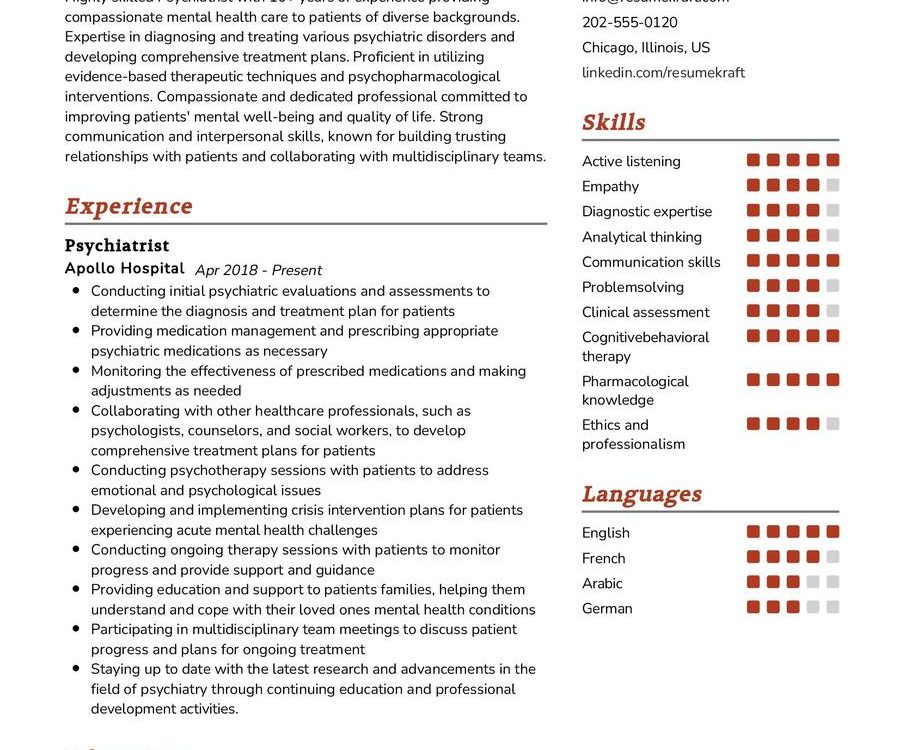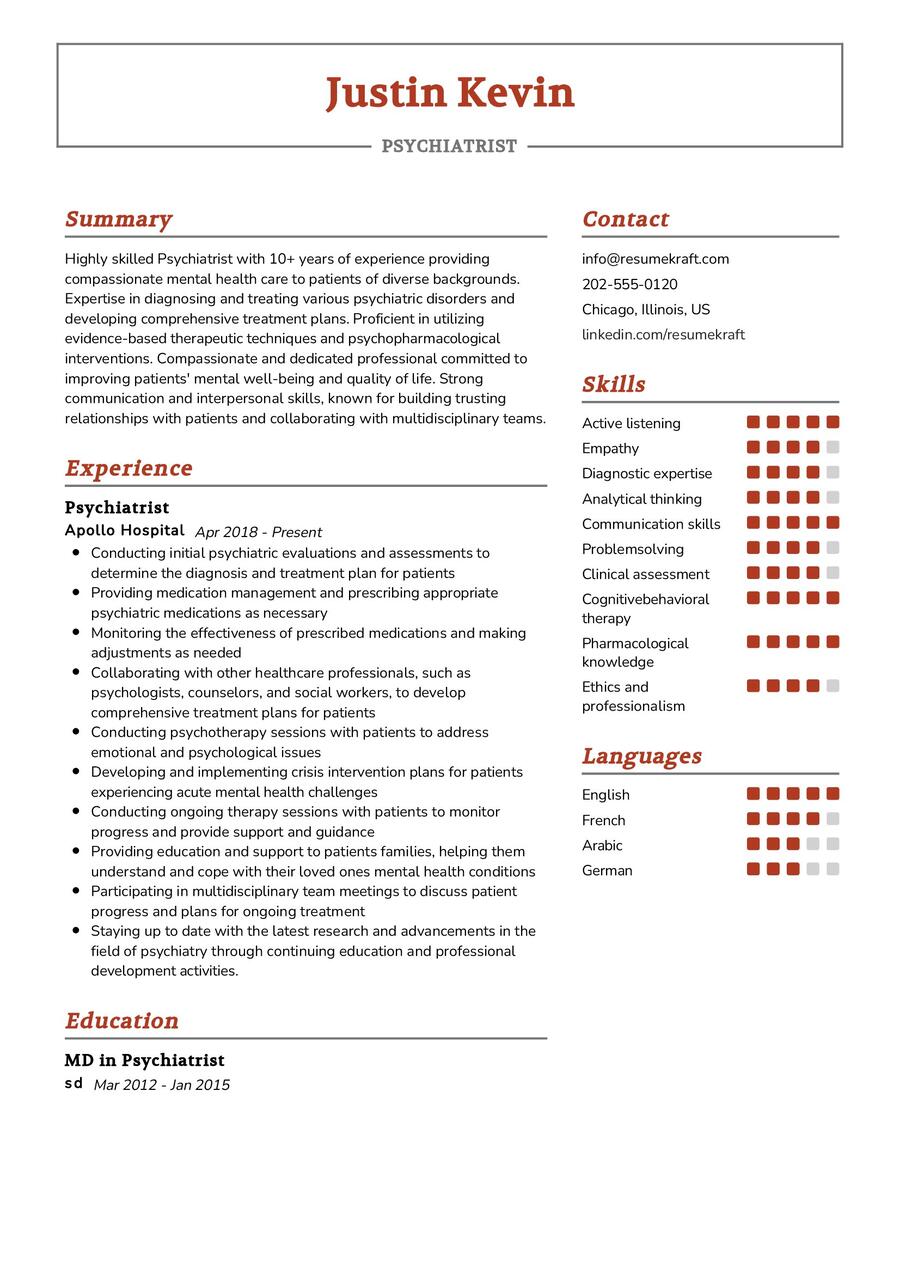Exploring the Role of a Psychiatrist
As the field of mental health gains prominence, the role of a Psychiatrist has become increasingly crucial in today’s society. This article delves into the multifaceted responsibilities of a Psychiatrist, blending clinical expertise with compassionate care. A Psychiatrist plays a pivotal role in promoting mental well-being and aiding individuals in their journey towards mental health.
Job Requirements for a Psychiatrist
Becoming a Psychiatrist involves meeting stringent requirements, a journey that demands both academic prowess and practical experience. Let’s explore the prerequisites for embracing the role of a Psychiatrist:
- A Doctor of Medicine (MD) or Doctor of Osteopathic Medicine (DO) degree from an accredited medical school.
- Completion of a psychiatric residency program to gain specialized training in mental health care.
- Licensure as a Psychiatrist, demonstrating competency and adherence to ethical standards.
- Strong communication skills, essential for building trust and rapport with patients.
- Empathy and compassion, crucial traits in understanding and addressing patients’ mental health concerns.
- Continued education to stay abreast of advancements in psychiatric treatments and therapies.
Acquiring additional certifications or specializations can enhance one’s profile in the competitive field of psychiatry.
Responsibilities of a Psychiatrist
The role of a Psychiatrist is diverse, encompassing a range of responsibilities that contribute to the well-being of individuals and communities. Let’s unravel the core duties that define the day-to-day life of a Psychiatrist:
- Conducting comprehensive psychiatric assessments to diagnose mental health conditions.
- Developing personalized treatment plans, incorporating psychotherapy, medication, or a combination based on individual needs.
- Collaborating with a multidisciplinary team to provide holistic care for patients.
- Monitoring and adjusting treatment plans based on patient progress and feedback.
- Providing crisis intervention and support during emergencies or acute episodes.
- Advocating for mental health awareness and reducing stigma through community engagement.
- Participating in research and staying updated on the latest advancements in psychiatric care.
Each responsibility carries the weight of fostering mental health and improving the lives of those seeking psychiatric support.
Crafting a Psychiatrist Resume
As you embark on creating a resume that stands out in the competitive healthcare landscape, consider these tips to effectively showcase your journey as a Psychiatrist:
- Highlight your clinical experience, detailing your expertise in diagnosing and treating various mental health disorders.
- Include specific examples of successful treatment outcomes, demonstrating your impact on patients’ lives.
- Quantify achievements, such as the number of patients treated or successful intervention rates.
- List relevant certifications and ongoing education to showcase your commitment to professional development.
- Personalize your resume for specific job applications, emphasizing relevant skills and experiences.
Your resume is a testament to your commitment to mental health and your ability to make a positive impact in the field of psychiatry.
Psychiatrist Resume Summary Examples
Your resume summary is the opening act of your career story, providing a snapshot of your experiences and contributions. Here are some examples to inspire you:
- “Compassionate Psychiatrist with a decade of experience in diagnosing and treating diverse mental health disorders, dedicated to improving patient well-being through personalized care.”
- “Experienced Psychiatrist with a focus on evidence-based treatments, successfully guiding individuals towards mental health recovery.”
- “Board-certified Psychiatrist with a passion for destigmatizing mental health, combining clinical expertise with a patient-centered approach.”
Your resume summary sets the tone for your entire career narrative, showcasing your unique strengths and dedication to the field.
Building Your Psychiatrist Resume’s Experience Section
Your experience section is the heart of your resume, narrating the stories of your impact on patients’ lives. Here are examples to guide you:
- “Led a team in implementing a community mental health program, increasing access to psychiatric care by 30%.”
- “Developed and conducted psychoeducational workshops on stress management, reaching over 500 community members.”
- “Implemented innovative telepsychiatry services, expanding mental health access to rural and underserved populations.”
Each experience showcases your ability to lead, innovate, and positively influence the mental health landscape.
Educational Achievements for a Psychiatrist Resume
Your educational journey is the foundation of your psychiatric expertise. Highlight your academic achievements and certifications:
- Doctor of Medicine (MD) in Psychiatry, XYZ Medical School, a comprehensive training ground for psychiatric practice, 2010.
- Psychiatry Residency Program, ABC Hospital, gaining specialized skills in diagnosis and treatment, 2014.
- Board Certified Psychiatrist, demonstrating proficiency and adherence to industry standards, 2016.
Your education section reinforces your foundation in psychiatric knowledge and showcases your commitment to ongoing learning.
Key Psychiatrist Skills for Your Resume
Your skill set is your toolkit, essential for providing quality mental health care. Let’s outline the key skills a Psychiatrist should possess:
Soft Skills:
- Empathy and compassion, foundational in understanding and addressing patients’ emotions.
- Effective communication, crucial for building rapport and facilitating therapeutic relationships.
- Active listening, a skill that enhances your ability to understand patients’ concerns and needs.
- Adaptability, essential in navigating the dynamic nature of mental health care.
- Collaboration, working effectively with a diverse healthcare team for holistic patient care.
Hard Skills:
- Diagnostic expertise, a deep understanding of mental health disorders and their presentations.
- Psychopharmacology knowledge, essential for prescribing and managing psychiatric medications.
- Psychotherapy skills, employing evidence-based therapeutic approaches for various conditions.
- Crisis intervention, effectively managing acute mental health crises.
- Research literacy, staying informed about the latest advancements in psychiatric care.
Each skill equips you to provide comprehensive, patient-centered psychiatric care.
Common Mistakes to Avoid in a Psychiatrist Resume
Steer clear of common pitfalls when crafting your resume to present yourself authentically and effectively. Avoid these mistakes:
- Using generic language, tailor your resume to showcase your unique contributions and strengths.
- Focusing solely on duties, highlight your achievements and the impact of your work on patient outcomes.
- Underestimating the importance of a cover letter, use it as an opportunity to express your passion for psychiatry.
- Overloading your resume with technical jargon, ensure clarity for both healthcare and non-healthcare professionals.
- Neglecting proofreading, a polished resume reflects your attention to detail and professionalism.
Avoiding these mistakes ensures your resume stands out in the competitive field of psychiatry.
Key Takeaways for Your Psychiatrist Resume
As you craft your Psychiatrist resume, remember these key takeaways:
- Highlight your clinical experience and successful treatment outcomes.
- Showcase your commitment to ongoing learning through certifications and continued education.
- Personalize your resume for specific job applications, emphasizing relevant skills and experiences.
- Express your unique contributions and strengths, setting yourself apart in the field of psychiatry.
Remember, your resume is a reflection of your dedication to mental health and your ability to make a positive impact in the lives of those you serve.
Finally, feel free to utilize resources like AI Resume Builder, Resume Design, Resume Samples, Resume Examples, Resume Skills, Resume Help, Resume Synonyms, and Job Responsibilities to create a standout application and prepare for the Psychiatrist job interview.


